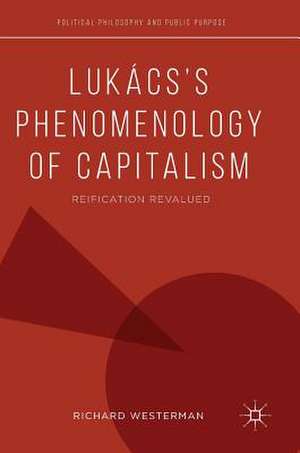Lukács’s Phenomenology of Capitalism: Reification Revalued: Political Philosophy and Public Purpose
Autor Richard Westermanen Limba Engleză Hardback – 30 aug 2018
| Toate formatele și edițiile | Preț | Express |
|---|---|---|
| Paperback (1) | 374.27 lei 39-44 zile | |
| Springer International Publishing – 13 dec 2018 | 374.27 lei 39-44 zile | |
| Hardback (1) | 588.37 lei 6-8 săpt. | |
| Springer International Publishing – 30 aug 2018 | 588.37 lei 6-8 săpt. |
Din seria Political Philosophy and Public Purpose
- 20%
 Preț: 689.87 lei
Preț: 689.87 lei - 15%
 Preț: 711.56 lei
Preț: 711.56 lei -
 Preț: 387.75 lei
Preț: 387.75 lei -
 Preț: 381.98 lei
Preț: 381.98 lei - 15%
 Preț: 642.36 lei
Preț: 642.36 lei - 15%
 Preț: 640.06 lei
Preț: 640.06 lei -
 Preț: 383.50 lei
Preț: 383.50 lei - 18%
 Preț: 1408.40 lei
Preț: 1408.40 lei - 18%
 Preț: 894.46 lei
Preț: 894.46 lei - 15%
 Preț: 642.51 lei
Preț: 642.51 lei - 18%
 Preț: 946.24 lei
Preț: 946.24 lei -
 Preț: 420.40 lei
Preț: 420.40 lei - 15%
 Preț: 500.73 lei
Preț: 500.73 lei - 18%
 Preț: 784.48 lei
Preț: 784.48 lei - 15%
 Preț: 583.45 lei
Preț: 583.45 lei -
 Preț: 425.58 lei
Preț: 425.58 lei - 18%
 Preț: 889.43 lei
Preț: 889.43 lei - 15%
 Preț: 638.43 lei
Preț: 638.43 lei - 18%
 Preț: 780.37 lei
Preț: 780.37 lei - 18%
 Preț: 721.33 lei
Preț: 721.33 lei - 18%
 Preț: 783.50 lei
Preț: 783.50 lei - 18%
 Preț: 789.98 lei
Preț: 789.98 lei - 18%
 Preț: 729.68 lei
Preț: 729.68 lei - 18%
 Preț: 783.35 lei
Preț: 783.35 lei - 18%
 Preț: 895.89 lei
Preț: 895.89 lei -
 Preț: 391.02 lei
Preț: 391.02 lei -
 Preț: 385.25 lei
Preț: 385.25 lei -

Preț: 588.37 lei
Preț vechi: 692.19 lei
-15% Nou
Puncte Express: 883
Preț estimativ în valută:
112.59€ • 116.79$ • 93.88£
112.59€ • 116.79$ • 93.88£
Carte tipărită la comandă
Livrare economică 27 martie-10 aprilie
Preluare comenzi: 021 569.72.76
Specificații
ISBN-13: 9783319932866
ISBN-10: 3319932861
Pagini: 327
Ilustrații: XVII, 308 p.
Dimensiuni: 148 x 210 x 24 mm
Greutate: 0.54 kg
Ediția:1st ed. 2019
Editura: Springer International Publishing
Colecția Palgrave Macmillan
Seria Political Philosophy and Public Purpose
Locul publicării:Cham, Switzerland
ISBN-10: 3319932861
Pagini: 327
Ilustrații: XVII, 308 p.
Dimensiuni: 148 x 210 x 24 mm
Greutate: 0.54 kg
Ediția:1st ed. 2019
Editura: Springer International Publishing
Colecția Palgrave Macmillan
Seria Political Philosophy and Public Purpose
Locul publicării:Cham, Switzerland
Cuprins
1. Introduction: The Lukács Debate.- 2. Reality And Representation In Art.- 3. The History Of History & Class Consciousness.- 4. The Forms Of Social Reality.- 5. The Interpellation Of The Subject.- 6. Self-consciousness And Identity.- 7. The Social And The Natural.- 8. Conclusion: Lukács In Late Capitalism.
Recenzii
“This monograph is also an invitation to relaunch a phenomenological inquiry into social alienation. It allows us to see phenomenology’s potential for understanding our contemporary situation, alongside, why not, contemporary Critical Theory.” (Clémence Saintemarie, Phenomenological Reviews, November 19, 2019)
“One of the formidable strengths of this book is its fluid style and clear signposting that makes the often-difficult subject material very readable. … Lukács’s Phenomenology of Capitalism is a major contribution to the recent season of Lukács studies, and it succeeds in offering both a new and a convincing perspective on Lukács’s thought.” (Robert Jackson, Symposium, c-scp.org, August 28, 2019)
Notă biografică
Richard Westerman is an Associate Professor at the University of Alberta, Canada. He completed his PhD at Cambridge, before a postdoctoral fellowship at the University of Chicago. His work is primarily on Lukács and the Frankfurt School, and he has also published on philosophical aesthetics.
Textul de pe ultima copertă
This book offers a radical new interpretation of Georg Lukács’s History and Class Consciousness, showing for the first time how the philosophical framework for his analysis of society was laid in the drafts of a philosophy of art that he planned but never completed before he converted to Marxism. Reading Lukács’s work through the so-called “Heidelberg Aesthetics” reveals for the first time a range of unsuspected influences on his thought, such as Edmund Husserl, Emil Lask, and Alois Riegl; it also offers a theory of subjectivity within social relations that avoids many of the problems of earlier readings of his text. At a time when Lukács’s reputation is once more on the rise, this bold new reading helps revitalize his thought in ways that help it speak to contemporary concerns.
Caracteristici
Offers one of the first full-scale accounts of Lukács’s Heidelberg Aesthetics in English. Reveals the links between Lukács’s account of society and his philosophy of art. Applies Lukács’s thought beyond the paradigm of class conflict, showing what it implies for analysis of human domination of nature, and the notion of rationality as such.
